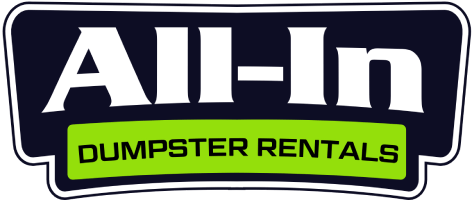Learn what materials are prohibited in construction dumpsters in Asheville and find alternative disposal methods for materials like hazardous waste, electronics, and heavy items.
When managing construction waste in Asheville and surrounding areas, knowing what cannot go in your rented dumpster is just as important as knowing what can. Disposing of prohibited materials can result in additional fees, rejected loads, and even potential environmental violations. This comprehensive guide outlines what materials are prohibited in construction dumpsters and provides alternative disposal methods to keep your project compliant with local regulations.
At All-In Dumpster Rentals, we’re committed to helping contractors and homeowners throughout Buncombe, Henderson, Haywood, and Madison counties manage their waste responsibly. Understanding these restrictions before your project begins can save you time, money, and potential compliance headaches.
Category 1: Prohibited Heavy Materials
While our dumpsters are designed to handle a variety of construction waste, certain heavy materials require specialized disposal methods due to their weight and environmental impact:
- Concrete, Dirt, Bricks, and Rocks: These materials are extremely heavy and can quickly exceed weight limits. Large quantities require specialized disposal at facilities like the Buncombe County Landfill, which has designated areas for inert materials. Small amounts mixed with other construction debris may be acceptable—call us to discuss your specific needs.
- Asphalt: Like concrete, asphalt requires specialized handling and recycling. The WNC Regional Air Quality Agency restricts asphalt disposal due to potential environmental impacts.
- Railroad Ties: These treated wood products contain creosote and other chemicals that require special handling. Contact the Buncombe County Landfill for disposal options.
Category 2: Prohibited Electronic Waste
Electronic waste contains valuable materials that can be recycled and potentially harmful components that require specialized processing:
- Televisions and Computer Monitors: These contain lead and other heavy metals that require proper recycling. The Buncombe County Landfill accepts these items for recycling at their designated e-waste area.
- Computers and Office Equipment: Local recyclers like Asheville Recycling Center accept these items, often free of charge.
- Small Electronics: Items like phones, tablets, and gaming consoles should be taken to electronics recycling drop-off points throughout Asheville.
Category 3: Prohibited Hazardous Materials
Hazardous materials pose significant risks to the environment and require specialized handling and disposal:
- Asbestos: This carcinogenic material requires certified abatement professionals and specific disposal protocols. Contact the WNC Regional Air Quality Agency for guidance on proper handling.
- Paint and Paint Products: Liquid paint, thinners, and strippers cannot be placed in dumpsters. The Buncombe County Landfill holds periodic Household Hazardous Waste collection events for these items.
- Chemicals and Solvents: Products like adhesives, wood stains, varnishes, and cleaning solvents require special disposal through hazardous waste collection programs.
- Fluorescent Bulbs and Ballasts: These contain mercury and other hazardous components. Many hardware stores accept these for recycling, or they can be taken to the county’s hazardous waste collection.
- Batteries: All types, including alkaline, lithium, and lead-acid batteries, are prohibited. Local retailers often provide battery recycling collection points.
Category 4: Prohibited Appliances and Equipment
Large appliances and equipment with specific components require specialized handling:
- Refrigerators, Freezers, and Air Conditioners: These contain refrigerants that must be properly removed before disposal. Our junk removal service can arrange for proper handling of these items.
- Washers, Dryers, Dishwashers: While these don’t contain hazardous materials, their size and weight make them prohibited in standard dumpsters. Consider our junk removal service for these items.
- Water Heaters: These can often be recycled for their metal value. Contact local scrap metal recyclers or our junk removal service for proper disposal.
- Propane Tanks: Even when empty, these present explosion hazards and cannot be placed in dumpsters. Many propane retailers will accept empty tanks for recycling.
Category 5: Prohibited Automotive Materials
Automotive components contain various hazardous materials and require specialized handling:
- Tires: Tires are banned from landfills in North Carolina and cannot be placed in dumpsters. Many tire retailers accept old tires for a small fee, or they can be taken to the Buncombe County Landfill’s tire collection area.
- Motor Oil and Filters: These must be recycled properly. Many auto parts stores accept used oil for recycling.
- Automotive Batteries: These contain lead and acid and must be recycled. Most retailers that sell batteries will accept old ones for recycling.
- Gasoline and Automotive Fluids: These flammable and toxic liquids require specialized disposal through hazardous waste collection programs.
Alternative Disposal Solutions
When you encounter prohibited materials during your construction project, consider these alternative disposal options in the Asheville area:
- Buncombe County Landfill Special Waste Programs: The landfill accepts many prohibited items through specialized collection programs, including electronics, appliances, and some hazardous materials.
- All-In Dumpster Rentals Junk Removal Service: Our specialized junk removal service can handle many items that cannot go in dumpsters, including appliances, electronics, and some hazardous materials. We ensure proper disposal or recycling of these items.
- Specialized Recyclers: Asheville has numerous specialty recyclers that accept specific materials like metal, electronics, and construction materials for recycling.
- Habitat for Humanity ReStore: For usable building materials, fixtures, and appliances in good condition, consider donating to the local Habitat ReStore, which may even offer pickup services.
- Hazardous Waste Collection Events: Buncombe County hosts periodic hazardous waste collection events for residents and small businesses to safely dispose of chemicals, paints, and other hazardous materials.
Need Help with Special Waste Disposal?
Navigating the complex world of waste disposal regulations can be challenging. At All-In Dumpster Rentals, we’re committed to helping you manage all aspects of your construction waste properly and efficiently. Our knowledgeable team can provide guidance on handling prohibited materials and recommend appropriate disposal options for your specific needs.
For personalized assistance with your construction waste management, call us at (828) 776-5517. Our family-owned business prides itself on being “The Nicest Dumpster Rental Company in Asheville,” offering both standard dumpster rentals and specialized junk removal services to ensure your project remains compliant with all local regulations.
